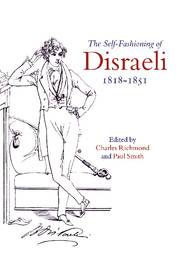Book contents
- Frontmatter
- Contents
- List of contributors
- Preface
- Introduction
- 1 Disraeli's education
- 2 Disraeli's romanticism: self-fashioning in the novels
- 3 Disraeli's crucial illness
- 4 Disraeli and orientalism
- 5 ‘A Hebrew to the end’: the emergence of Disraeli's Jewishness
- 6 Disraeli's interpretation of English history
- 7 Disraeli's politics
- Notes
- Index
1 - Disraeli's education
Published online by Cambridge University Press: 19 March 2010
- Frontmatter
- Contents
- List of contributors
- Preface
- Introduction
- 1 Disraeli's education
- 2 Disraeli's romanticism: self-fashioning in the novels
- 3 Disraeli's crucial illness
- 4 Disraeli and orientalism
- 5 ‘A Hebrew to the end’: the emergence of Disraeli's Jewishness
- 6 Disraeli's interpretation of English history
- 7 Disraeli's politics
- Notes
- Index
Summary
‘A sneer! Oh! Ladylove, do I ever sneer?’ (Vivian Grey)
In 1852, one month after Disraeli became chancellor of the exchequer, Heinrich Heine wrote: ‘A singular phenomenon in England – a novelist becoming a minister.’ Disraeli was not the first public man with literary inclinations; but the romantic and imaginative quality of his writing makes him unique. This anomalous combination of romantic artist and practical politician, together with the apparent disjunction between what he wrote in his books and what he did in political life, has caused his biographers to comprehend him either as actuated by a mere vulgar ambition to climb, or as a far-sighted statesman, whose career was guided by transcendent ideas. If the former view is accepted, then a charge of insincerity must be sustained; if the latter is accepted then his opportunism is inexplicable. In this chapter, on the basis of an examination of his unconventional education, I explore whether or not it is possible to combine Disraeli's romantic ideas and cynical politics as an organic whole, without excluding either one or the other.
Little is known of Disraeli's education prior to his fourteenth year. At a very early age, he was sent to a school at Islington, which was kept by a Miss Roper. He was then moved to a boarding school at Blackheath, whose headmaster was a nonconformist minister named Potticary. Later in life Disraeli had little recollection of Blackheath but, according to one of his schoolfellows, Disraeli and another Jewish boy were required to stand at the back of the room during prayers.
- Type
- Chapter
- Information
- The Self-Fashioning of Disraeli, 1818–1851 , pp. 16 - 41Publisher: Cambridge University PressPrint publication year: 1999



